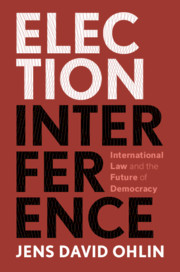Book contents
- Election Interference
- Election Interference
- Copyright page
- Dedication
- Contents
- Acknowledgements
- Introduction
- 1 What Is Election Interference?
- 2 Election Interference Is Not Cyber-War
- 3 Limits of the Sovereignty Framework
- 4 The Promise of Self-Determination
- 5 Foreign Electioneering and Transparency
- 6 Free Speech and Elections
- 7 The Value of Criminal Prosecutions
- 8 Soliciting Foreign Interference
- Conclusion
- Index
Introduction
Published online by Cambridge University Press: 09 June 2020
- Election Interference
- Election Interference
- Copyright page
- Dedication
- Contents
- Acknowledgements
- Introduction
- 1 What Is Election Interference?
- 2 Election Interference Is Not Cyber-War
- 3 Limits of the Sovereignty Framework
- 4 The Promise of Self-Determination
- 5 Foreign Electioneering and Transparency
- 6 Free Speech and Elections
- 7 The Value of Criminal Prosecutions
- 8 Soliciting Foreign Interference
- Conclusion
- Index
Summary
Although election interference is not new, Russia’s social media strategy for election interference in the 2016 election represented a new form of interference in the political affairs of the United States. The advent of social media electioneering raised a number of important political questions. While political commentators were debating these questions, international lawyers were engaged in a parallel conversation, one that was more technical but just as consequential: Did Russia’s interference violate international law? Did Russia do something wrong by operating a troll farm to promote divisive rhetoric in the American political landscape? Did the use of cyber technologies turn the Russian interference into an illegal cyber-attack that triggered a right of response, a form of cyber self-defense? International lawyers generally fell into two camps, with one camp viewing the interference as illegal and another camp viewing it as regrettable but probably lawful under existing legal frameworks. But everyone agreed that Russia’s aggressive use of social media technology was a game-changer. This book argues that the “illegal” camp had it right – Russia did violate international law – but that the “illegal camp” had the wrong reasons for reaching this conclusion.
Information
- Type
- Chapter
- Information
- Election InterferenceInternational Law and the Future of Democracy, pp. 1 - 9Publisher: Cambridge University PressPrint publication year: 2020
